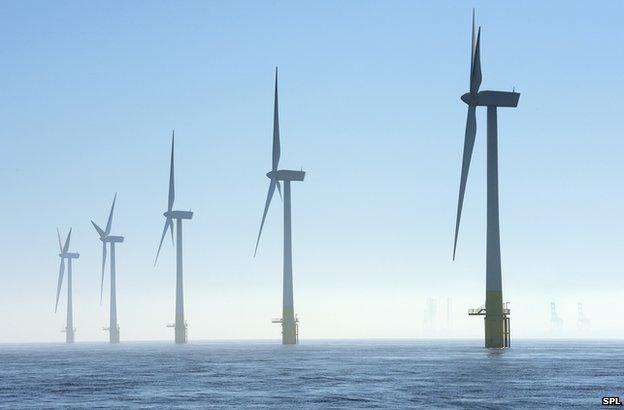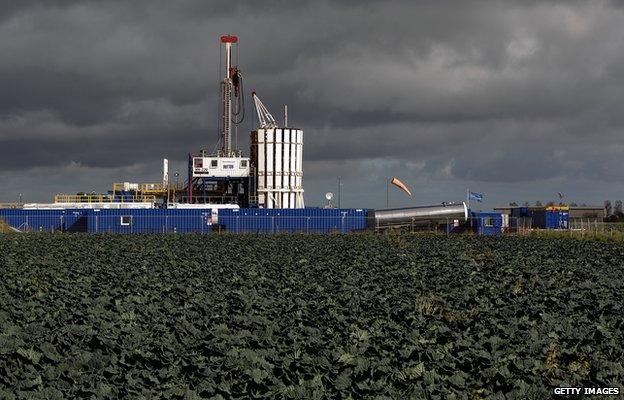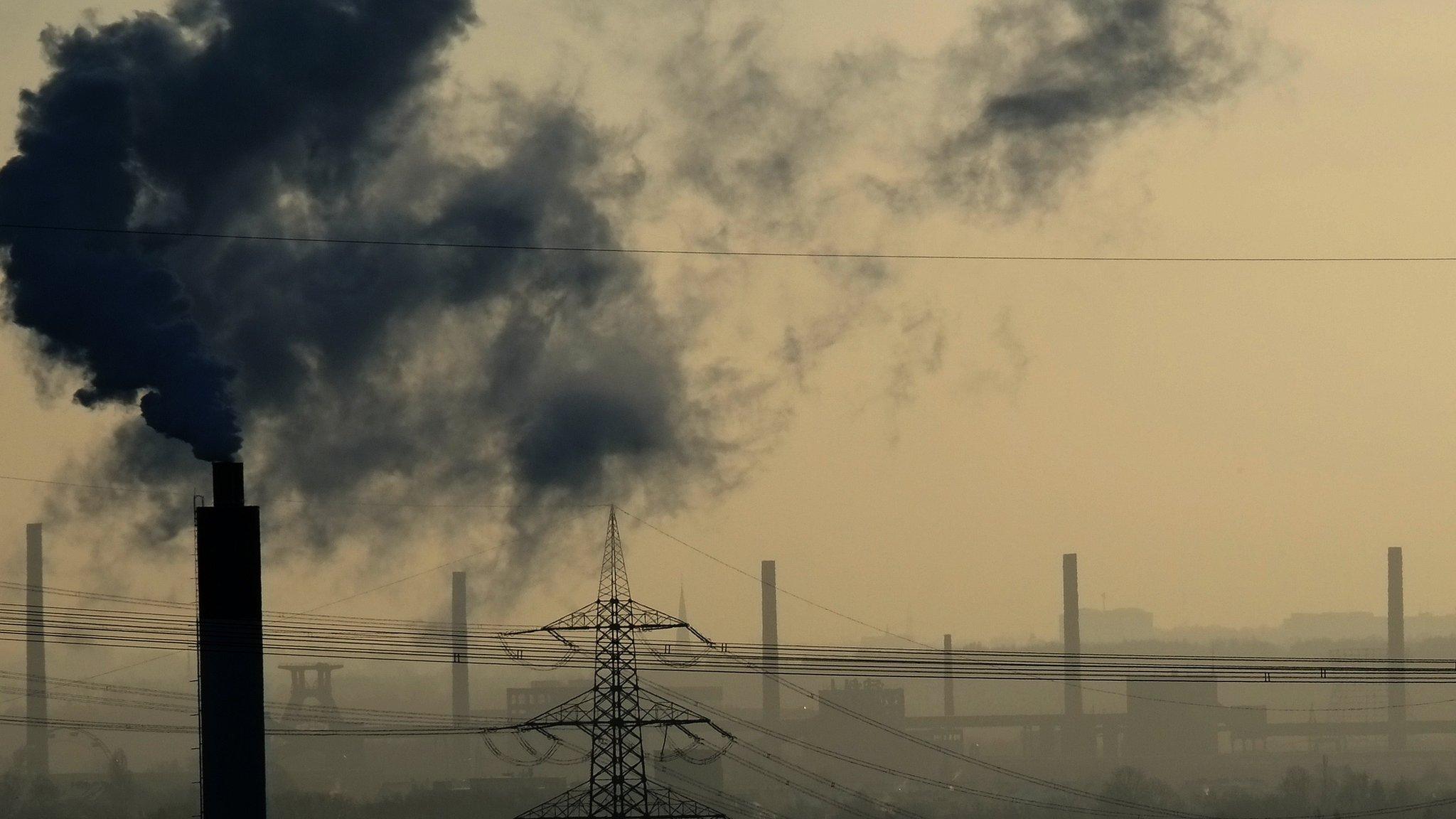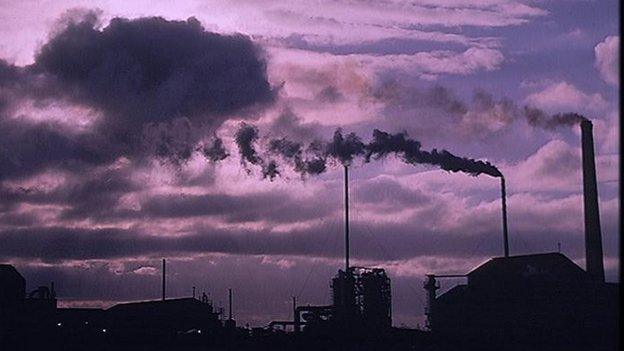Will the falling oil price undermine green energy?
- Published

Supporters of renewable energy say it is a more stable option than the volatile fossil fuel market
Common sense would surely tell you that if you slash the cost of one source of energy, then alternatives look less appealing.
You might think, therefore, that the crash in the price of oil must be dealing a potentially fatal blow to renewable power.
An illustration from recent history seems to back that up.
When the oil price spiked in the 1970s, the then US president Jimmy Carter had solar panels fixed to the White House roof, only to see his successor Ronald Reagan rip them off when the oil price tumbled.
Fast forward to the past few months and at first sight a similar effect appears to be happening as the share prices of many renewable energy companies take a hit.
Different markets
However, things are not so straightforward. The world of energy has changed.
For a start, oil does not compete with wind or solar power. They perform different roles - oil is still dominant in transport while renewables generate electricity.
Since the 1970s, the use of oil at power stations has dwindled. It was replaced by gas, which was seen as a cleaner and more secure option with supplies less vulnerable to international crises.
So the oil price does not directly affect the market that renewables are operating in.
Then there are the wind turbines and solar panels themselves. As technologies develop and become mass-produced, costs usually fall and that is what has happened in the last 10-15 years.
Better manufacturing techniques, soaring demand, intense competition - all have driven down prices for turbines and panels and further encouraged their spread.
And government policies to support renewables with subsidies - to help young green industries find their feet - show no sign of changing in the near future.

Renewable energy technology is getting cheaper and more efficient
China, in particular, facing a profound crisis of filthy air, is presiding over the largest programme of investment in clean power that the world has ever seen.
The Beijing government is under pressure from its citizens to do something about the pollution and one obvious response is to keep driving investment in renewables. A shift in the oil price, however profound, isn't likely to unpick that. Too much is at stake.
And in other countries pushing green power, ministers seem determined to stay the course - Britain with its carbon targets under the Climate Change Act, and the United States with as many as 30 states mandating that power companies produce a certain proportion of their output from green sources.
Gas revolution
But there are complications which hover over this whole question.
In some parts of the world, a fall in the oil price will drive a fall in the gas price - and since gas is the fuel that directly competes with renewables, this scenario in the long-term could obviously threaten them.
Meanwhile in the United States, the revolution in shale gas produced such a flood of the stuff that the gas price almost collapsed - which would pose a really serious challenge to wind and solar if they were not protected by government policy. That situation may yet change someday in the future.
And then there are the green technologies which are designed for transport rather than electricity generation. These may be at more risk.
Biofuels, derived from plants and included in European fuels, start to look much pricier if crude oil cheapens.
And electric cars may seem less attractive if owners, while charging their vehicles up from the grid, cast envious glances at yet another discount for fuel at the forecourts.

Fracking for shale gas dropped prices in the US, but remains controversial in the UK
But perhaps the biggest factor is one of the least tangible: uncertainty.
No one can tell how long the oil price will stay so low - less than a year, more than a year, several years?
People working in renewables say that the volatility in oil is precisely the reason to go green - prices are more stable, with fewer ups and downs.
But big renewable projects, such as the vast offshore wind farms planned for UK waters, need massive funding. And, for investors, an unquiet market may not exactly be a draw, especially when the energy giants are cancelling a lot of capital spending.
Striking a deal
On the horizon, at the end of the year, looms another issue: a summit on climate change in Paris. This is where 190 countries are meant to agree a deal on cutting greenhouse gases and on the table will be ideas for using less fossil fuel. So, will the low oil price be an uninvited guest?
The delegations from the oil economies of Russia, Iran and Venezuela are not likely to be in the best of moods. Saudi Arabia will probably repeat a demand, which infuriates others, to be compensated if the world does eventually ditch fossil fuels. And this is the kind of event where consensus and concession are badly needed.
On the other hand, there is a view is that if lower oil prices help boost growth in the coming months, some governments, especially the Europeans, might feel secure enough financially to take more action on climate change.
By this reasoning, the failure of the last summit - at Copenhagen in 2009 - was because world leaders were distracted and weakened by the banking and financial crisis still unfolding at that time.
And, according to this scenario, if there is a deal, almost any outcome will lead to the development of more renewables, whatever the oil price.
That's one perspective. There are plenty of others. I've been speaking to a wide range of experts in this field. And none of them sounds totally certain.
- Published27 January 2015
.jpg)
- Published16 January 2015

- Published27 January 2015

- Published7 January 2015

- Published2 November 2014
